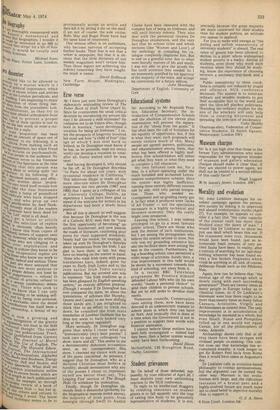Erse verse
Sr: I have just seen Denis Donoghue's elaborately misleading review of The Faber Book of Irish Verse (April 6). Since he contravenes his usual critical decorum by introducing my private life may I be allowed a mild rejoinder? He compares me to de Valera who, though born in America, "soon developed a vocation for being an Irishman." I enjoy the prospects of longevity involved but must ask how "a child of four" (the age at which 1 was sent back to Ireland, as Dr Donoghue must know if he has, as he pretends, read my entire work) can develop a vocation so total: after all, Dante waited until he was nine!
And having developed it, why should he hie off, as Dr Donoghue describes "to Paris for about ten years, with occasional residence in California." This laborious illogic is made all the more obscure since Dr Donoghue suppresses the two periods (1967 and 1968) that I spent as a colleague of his at University College, Dublin, an experience I would have been glad to repeat if the welcome for writers in his department had been a shade more positive.
But all this is absurd: as well suggest that because Dr Donoghue is the son of a Catholic RUC man that he "took the first opportunity of becoming" an artificial Southerner, and now patrols the roads of literature, cautioning Poor poets for their supposed misdeeds. Nearly half the review, for example, is taken up with Dr Donoghue's theories about translations from the Irish. I am glad to have them, at last, but they have no bearing on the matter in hand: those who want Irish texts with prose translations have, indeed, gone for years to Early Irish Lyrics and to the even earlier Irish Texts society publications. But my avowed aim was to represent "the Irish tradition as it has been glimpsed by English-speaking writers," an entirely different purpose. (though I wonder if Dr Donoghue has ever compared the texts, let alone the translations, of scholars like Murphy, Greene and Carney to see how shifting those sands are. I am delighted to think that in an effort to track me down, he consulted the Irish texts translation of Leablzar Gabhala but he does not seem to have looked very long at the original opposite!) More seriously, Dr Donoghue suggests that while I chose what are "demonstrably (my) best poems" I took care to put my colleagues "on show, warts and all." This seems to me a demonstrably dishonest accusation since, as my correspondence files show, 1 checked my choice with most of the. poets concerned. As penance I suggest that Dr Donoghue, who as a declared Christian must believe in humility, should demonstrate why any of the poems I chose to represent myself are better than, say, 'The Leaping Fire' section of The Rough Field. Or withdraw his insinuation.
Finally, though Dr Donoghue obviously finds it distasteful (probably for the biographical reasons noted above), the majority of Irish poets, from Amergin through Swift to Austin Clarke have been obsessed with the complex fate of being an Irishman, and will until history relents. They also deal with the perennial themes Dr Donoghue enumerates, and the very fact that he echoes titles and whole sections (like 'Women and Love') of the anthology in compiling his catalogue completely disproves him. But to end on a grateful note: due to what were literally matters of life and death, I was not able to give the proofs the fine tooth attention they needed. So I am immensely gratified by his approval of the majority of the texts, and accept his corrections for a future edition.
John Montague Cepartment of English, University of Cork


































 Previous page
Previous page